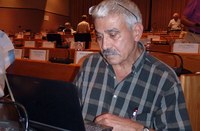 At first glance, it may seem improbable, but oil-rich Gulf States are turning to nuclear power to meet at least a portion of their future energy needs, says Adnan Shihab-Eldin, director general of the Kuwait Foundation for the Advancement of Sciences (KFAS).
At first glance, it may seem improbable, but oil-rich Gulf States are turning to nuclear power to meet at least a portion of their future energy needs, says Adnan Shihab-Eldin, director general of the Kuwait Foundation for the Advancement of Sciences (KFAS).
Shihab-Eldin made his remarks at the 44th session of the Erice International Seminars on Planetary Emergencies held in Erice, Italy, from 19 to 24 August 2011. TWAS attended the event at the invitation of Antonino Zichichi (TWAS Associate Fellow 1986), founder and chair of the seminar series.
Shihab-Eldin cites three reasons for the Arab region's recent interest in nuclear power.
First, he states that the region's growing population has prompted additional demand for electricity and other forms of energy.
Second, he notes that not all Arab countries are rich in gas and that "only two Arab countries have substantial 'isolated' supplies of natural gas not associated with oil production – Libya and Qatar." As a result, he observes, many Arab states will need to "import natural gas to meet their non-transportation energy needs as an alternative to burning valuable export-earning oil."
And, third, he says that oil-rich Arab countries "have been increasingly reluctant to divert a high-value export commodity such as oil to the domestic market." Oil in Saudi Arabia, for example, accounts for more than 70% of government revenues and, in Kuwait, it represents more than 80% of export revenues. As a matter of national economic policy, governments have decided that it is wiser to sell the oil abroad than to consume it at home – if they can find cheaper energy alternatives.
According to Shihab-Eldin, "the key factor driving interest in nuclear power in the Arab region is the price of natural gas on the international energy market. If the price of natural gas remains above USD7 per million BTU, nuclear power becomes economically viable as an alternative to gas." Today, for example, the price of imported natural gas averages USD13 per million BTU in Kuwait. Energy experts project that the price will remain at that level or climb even higher in the years ahead.
In 2007, the United Arab Emirates announced plans to build 14 nuclear units, with four of these to be built by 2024. The first would go online in 2017. In 2009, Kuwait established the Kuwait National Nuclear Energy Committee and announced that it would be exploring strategies for building four reactors with electricity generation beginning in 2020. Saudi Arabia launched a project to build a City for Atomic and Renewable Energy in 2009 and earlier this year announced its intention to build 16 nuclear units.
Less than a year ago, the Arab region was on track to build some 20 nuclear reactors over the next two decades. But two dramatic events, Shihab-Eldin says, have since slowed the advance towards nuclear energy. The Arab Spring has upended the political environment across the region and raised the need to gain public consensus on nuclear issues. And the nuclear accident at Fukushima Dai-ichi in Japan has led countries throughout the world, including in the Arab region, to re-examine their commitments to nuclear power.
Shihab-Eldin maintains that what has happened over the past six months will delay but not reverse the Arab region's efforts to build nuclear power units. He projects that by 2030 the region will have 10, not 20, nuclear units on line.
"The high price of imported natural gas and the revenue that exported oil provides will continue to spur support for nuclear power", he says. But Arab countries, he adds, "will now have to work hard to gain public support for nuclear energy in the aftermath of the Arab Spring and, at the same time, re-examine safety issues in light of the nuclear accident in Japan."

